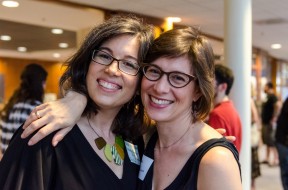These remarks were delivered by JOIN for Justice Executive Director, Karla Van Praag, at the 15th Annual Siyyum/Graduation on June 24th, 2013.

In this past week’s New Yorker, Malcolm Gladwell tells the story of economist Albert O. Hirschman who embraced uncertainty and failure for its essential role in progress. He wrote, for example, of a tunnel constructed through the Hoosac Mountain in Western Massachusetts in the 1800’s that would never had been built had engineers correctly projected how difficult it would be to penetrate. Yet after it’s completion, this railway played a pivotal role in the developing economy of Massachusetts. This example, but one of many, he held the theory that our failures are often the precursors to our successes. Therefore we should not shy from doubt inherent in our aspirations, but welcome it.
When reading this article, I found myself reminded of one of the maxims we teach our Fellows, and indeed anyone who aspires to become an organizer. Embrace failure, we say. You are going to have a lot of it. Indeed, one of our partner organization’s teaches, if you are not failing at least 30% of the time, you are not pushing yourself hard enough.
We’ve all been to graduations where speaker after speaker tells stories of success, happy tales where they were magnificent and everything worked out right. Listening to those tales sometimes engenders a sense of isolation and skepticism in the listener – you know that’s not how your life works, and you feel more alone.
Not here. At JOIN, we are ready to embrace our leaders’ and our own mistakes. We willingly embrace struggle. We embrace failure. Because our failures are real, but, if we cultivate the charred earth with determination, strategy, and creativity, the seeds of recovery will begin to grow out of that ground. Seeds that may never have sprouted it we played it safe. Tonight our fellows will be bold enough to share stories of breaking up, stories of failure, stories of our ideas being challenged, and also the honest happy tales of how they came out the other side and succeeded beyond their expectations.
If JOIN promoted ourselves to our partner organizations and to our foundations with the slogan “We love failure”, I’m not sure you all would be sitting here. But, here, when we have brought our community together, we can be clear on what a role it plays in our work. Because, if you are going to enter the space of attempting public leadership, you had better get comfortable with failure real fast. There is nothing more uncertain than efforts to solve social problems. You can’t predict most of what is going to happen. You do know that there is a complex sea of competing interests keeping things the way they are. When you decide to lead, you are, as Marshall Ganz teaches, accepting responsibility for enabling others to achieve shared purpose, in the face of uncertainty. This very decision takes courage to act – you don’t know what the outcome will be. This courage is a precursor to leadership. These are some brave people in front of you, as you’ll see soon enough. They are courageous enough to lead, as they’ve shown us this year and will show us in the years ahead.
We teach organizing to provide the frameworks and tools to navigate this uncertainty. Because there is so much uncertainty, because failure is always a possibility, because the stakes are so high, it’s important to learn how to lead, how to knit people together, how to strategize, how to take action. Unless you know how to react strategically and creatively, the failure is the final chapter, not a new beginning.
Yet, (sorry to break it to you,) knowing organizing is not a magic pill. The context of the situation always towers over the theory for how to approach it. The mountain is denser than we thought. The public official renegs on their deal. The people who obviously were going to follow through… don’t. When context doesn’t line up with our theory, then what do we do? How do we gain the experience to continually react to the unknown? This is what makes the JOIN experience so valuable to have in the beginning of one’s efforts to lead. For 15 years, the JOIN Fellowship model has been apprenticeships with Jewish and secular social change organizations combined with training, with mentors, with educators and with a supportive Jewish community. It is this smaller and larger community which enables these emerging leaders – that we selected from among the many that applied to be part of this experience for their very propensity to succeed – to ultimately succeed. Because they lift each other up after they fall, they share their own learning about how to approach change, and they keep each other courageous when it gets hard. JOIN may have planted the seeds, but it is the community they build together which has enabled so many people to have such an impact on countless organizations in Boston and beyond. This night is just the beginning. These peers among you, as you already know, are the teachers of your future.
I learned recently that when you are trying to build muscle mass, your body experiences it as tiny little tears. Each time you put stress on your muscles, they break a little. But your body responds in two ways – it not only repairs the broken cells but replaces the dead muscle cells with more cells. It prepares you to cope with similar situations in the future. Our body gets stronger with every failed cell. Without the failure, we remain weak.
So as you hear our outstanding fellows’ stories tonight of breaking up, whether they be muscles or friendships or efforts at change, remember failure’s necessary role before the to break through. Despite our hopes at avoiding failures, it’s inevitability may be the very reason we succeed. We are getting stronger with every fallen step.






